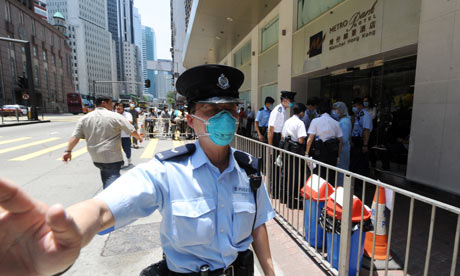
Latest statistics
Since The World Health Organisation raised its swine flu pandemic alert to level five on 29 April, the outbreak has affected 41 countries. According to the latest figures from the WHO, 21 countries have officially reported 1,124 cases of influenza A (H1N1) infection. The worst affected are;
• Mexico: 101 estimated deaths (25 confirmed), 590 confirmed cases.
• US: 2 deaths, 279 confirmed cases.
• Canada: 140 confirmed cases.
• Spain: 57 confirmed cases.
• UK: 32 confirmed cases.
• Germany: 9 confirmed cases.
• New Zealand: 6 confirmed cases.
Is it safe to travel?
Despite the European Union's health commissioner Androulla Vassiliou's comments on 27 April urging people to avoid travelling to Mexico or the US as the first suspected cases of swine flu were reported in Europe, the WHO has not changed its advice with regard to international travel: "WHO does not recommend restricting international travel."
In a statement on 1 May, the WHO said: "Limiting travel and imposing travel restrictions would have very little effect on stopping the virus from spreading, but would be highly disruptive to the global community."
"Regarding the risk of being infected by an influenza virus, travellers are advised, whenever possible, to avoid crowded enclosed spaces and close contact with people suffering from acute respiratory infections. Hand-washing after direct contact with ill persons or their environment may reduce the risk of illness. Ill persons should be encouraged to practice cough etiquette (maintain distance, cover coughs and sneezes with disposable tissues or clothing, wash hands)."
Despite this, France called for an EU flights ban on 30 April after the first swine flu death outside Mexico.
Foreign and Commonwealth Office advice
The Foreign and Commonwealth Office (FCO) changed its advisory at 11pm on 27 April advising against all but essential travel to Mexico.
In response to this, Thomson and First Choice Holidays cancelled all holidays to Cancún and Cozumel on the Yucatán Peninsula until 8 May, as did Thomas Cook. Thomson and First Choice put on an extra flight last Thursday to collect 200 holidaymakers who chose to cut short their holidays in the beach resorts. They have now extended the cancellation of holidays to Mexico until 18 May while Thomas Cook has cancelled holidays to Cancún uuntil 22 May.
British Airways is still operating four flights a week to Mexico City, but is offering its customers the option of making amendments (a change of dates or an alternative destination up to the same value) without incurring an administration fee on bookings while the FCO advisory against travel to Mexico remains.
Worst hit countries
Mexico
On 1 May, Mexico began an unprecedented nationwide shutdown in a bid to contain the spread of the virus and Mexicans were told to stay at home for five days. Today, President Felipe Calderon announced a return to "normalcy", with people going back to work tomorrow, cafes and restaurants reopening, and universities and schools opening their doors on Thursday.
US
Cases grew to at least 279 in 36 states, and on Tuesday 28 April, California Governor Arnold Schwarzenegger announced a widespread state of emergency in response to the H1N1 "swine flu" outbreak. His official proclamation mentions "conditions of extreme peril to the safety of person and property". However, California has ostensibly been going about its business as usual.
Latest events in Asia
Asia is reacting vigorously to the new global threat, following the outbreak of SARS in 2003, which killed 800 people.
China
China suspended flights from Mexico on 2 May; the day after the first confirmed case of swine flu in Asia was found in Hong Kong. At the Metropark Hotel, where the infected Mexican was staying, 274 guests and 100 workers have been quarantined and confined to the premises for a week. The city has been put on its highest health alert.
The American Embassy in Beijing says four US citizens are now or have been quarantined in China due to swine flu fears.
China has sent a plane to Mexico to collect Chinese nationals, while a plane chartered by the Mexican government arrived in Shanghai today to bring home more than 70 Mexicans who have been held in a hotel since last week despite not showing any symptoms of swine flu.
Japan
Japan has no confirmed cases of swine flu, but has opened fever clinics across the country. Planes arriving from North America are being boarded by health inspectors in surgical gowns, goggles and masks, and armed with thermographic guns. Passengers are not allowed to leave the plane until they have filled in a government Health Status questionnaire, and flight attendants are handing out masks.
Thailand
A health department team has been stationed along the Malaysia-Thailand border to screen travellers entering the country through Pengkalan Hulu.
And finally...
In Egypt, even before there is a single suspected case of the H1N1 virus in the country, either among humans or pigs, President Mubarak ordered 300,000-400,000 pigs to be killed. And in Afghanistan, the only pig in the country, a resident of Kabul zoo, has been put into quarantine.

